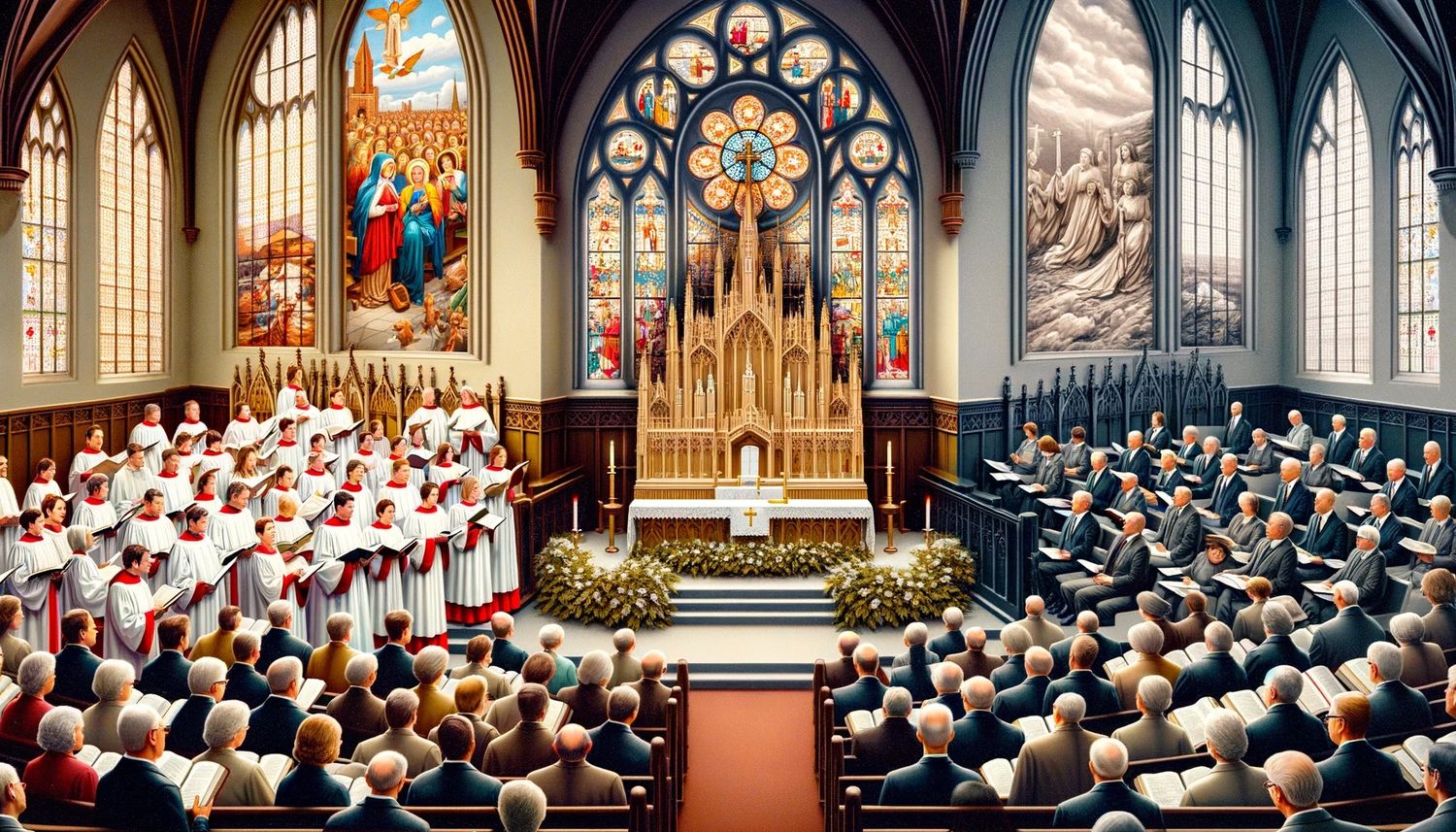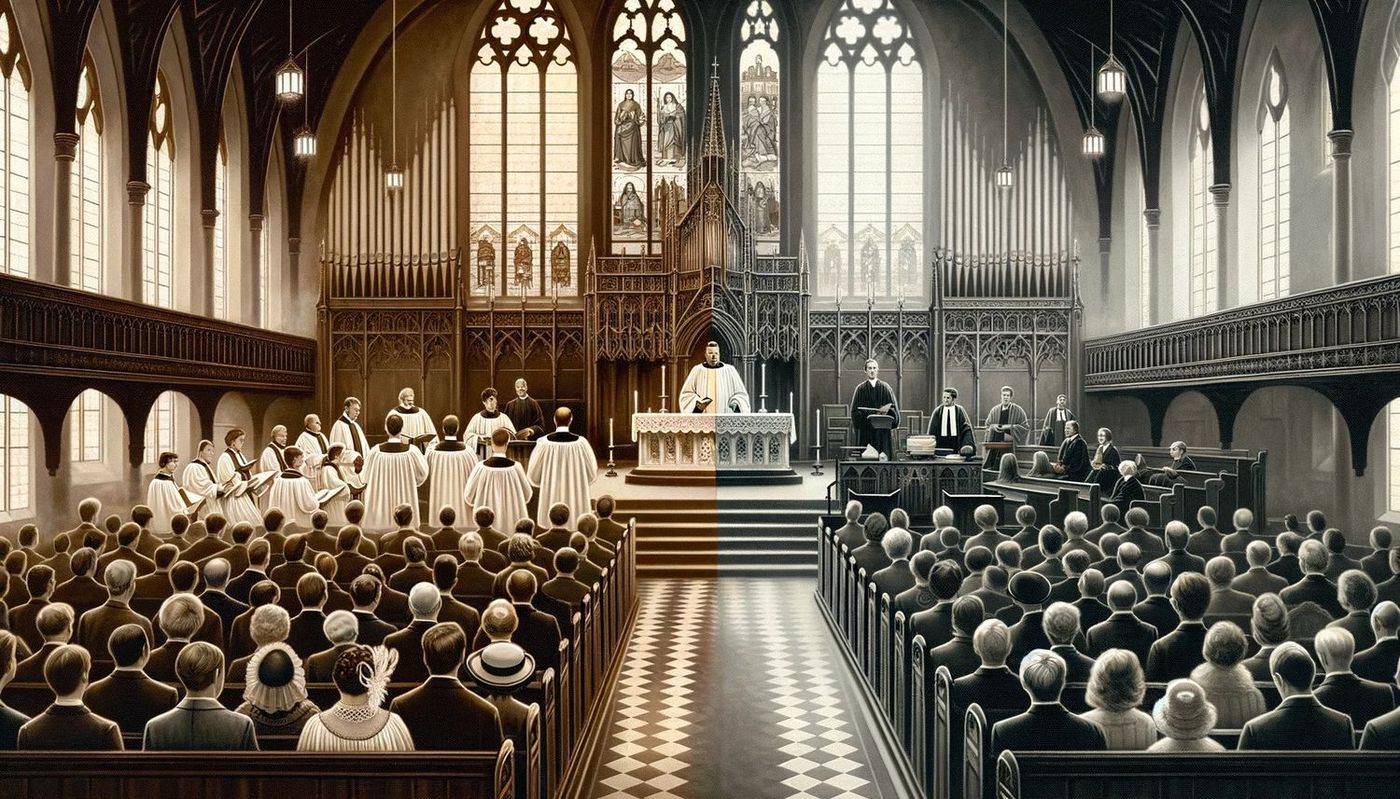Home>Theology and Spirituality>What Is The Difference Between Methodist Baptist And Presbyterian


Theology and Spirituality
What Is The Difference Between Methodist Baptist And Presbyterian
Published: February 20, 2024
Peter Smith, Editorial Director at Christian.net, combines deep insights into faith, politics, and culture to lead content creation that resonates widely. Awarded for his contributions to religious discourse, he previously headed a major organization for religious communicators, enhancing dialogue on faith's societal impacts.
Discover the key distinctions between Methodist, Baptist, and Presbyterian beliefs in theology and spirituality. Explore the unique perspectives and practices of each denomination.
(Many of the links in this article redirect to a specific reviewed product. Your purchase of these products through affiliate links helps to generate commission for Christian.net, at no extra cost. Learn more)
Table of Contents
Introduction
When it comes to Christian denominations, the differences in beliefs, practices, and traditions can be both fascinating and complex. Three prominent denominations within Protestant Christianity are Methodist, Baptist, and Presbyterian. Each of these denominations has its own unique history, theological perspectives, and organizational structures that distinguish them from one another. Understanding the differences between these denominations can provide valuable insights into the diverse tapestry of Christian faith and worship.
In this comprehensive exploration, we will delve into the historical roots, core beliefs, worship practices, and theological distinctions that set Methodist, Baptist, and Presbyterian traditions apart. By examining the foundational principles and doctrinal nuances of each denomination, we can gain a deeper appreciation for the rich diversity that exists within the Christian faith. Let's embark on a journey to unravel the distinctive characteristics that define Methodist, Baptist, and Presbyterian traditions, shedding light on the multifaceted nature of Christian spirituality and religious expression.
History of Methodism, Baptist, and Presbyterian
Methodist:
The Methodist movement traces its origins to 18th-century England, where it emerged as a revival within the Church of England led by John Wesley and his brother Charles Wesley. The Wesley brothers, along with George Whitefield, emphasized the importance of personal piety, social holiness, and the pursuit of a deeper relationship with God. Methodism rapidly spread to the American colonies, where it took root and flourished, eventually becoming a distinct denomination. Methodists placed a strong emphasis on evangelism, social justice, and the transformation of individuals and communities through the power of God's grace.
Baptist:
The Baptist tradition has its roots in the 17th century, with the English Separatist movement and the influence of leaders such as John Smyth and Thomas Helwys. Baptists are known for their belief in believer's baptism, which is the practice of baptizing only those who are able to make a personal profession of faith. This emphasis on individual conscience and voluntary commitment to the Christian faith has been a defining characteristic of Baptist identity. The Baptist movement also played a significant role in advocating for religious liberty and the autonomy of local congregations.
Presbyterian:
Presbyterianism has its origins in the Protestant Reformation, particularly in Scotland under the leadership of John Knox. The Presbyterian tradition is characterized by its adherence to a system of church governance based on the office of elders, or presbyters, who participate in decision-making and spiritual leadership within the church. Presbyterianism emphasizes the sovereignty of God, the authority of Scripture, and the importance of a well-ordered church structure. This denomination has played a significant role in shaping the theological landscape of Protestantism, particularly through its confessional documents such as the Westminster Confession of Faith.
These historical trajectories have shaped the distinct identities of Methodism, Baptist, and Presbyterianism, influencing their theological emphases, ecclesiastical structures, and approaches to Christian discipleship.
Beliefs and Practices
Methodist:
Methodist beliefs are grounded in the Wesleyan theological tradition, which emphasizes the concepts of prevenient grace, justifying grace, and sanctifying grace. Methodists believe in the universal reach of God's grace, which precedes and enables human response to the Gospel. They emphasize the importance of personal holiness, social justice, and the pursuit of Christian perfection, viewing salvation as a transformative journey empowered by the Holy Spirit. Methodists practice open communion, welcoming all baptized Christians to partake in the Eucharist, and they uphold the sacraments of baptism and Holy Communion as means of God's grace.
Baptist:
Baptist beliefs center on the authority of Scripture, the priesthood of all believers, and the autonomy of the local church. They emphasize believer's baptism, viewing it as a symbolic act of faith and a public declaration of one's commitment to Christ. Baptists hold congregational polity, where each local church governs its own affairs, and they prioritize the freedom of conscience and religious liberty. Baptists practice believer's baptism by immersion and observe the Lord's Supper as a memorial of Christ's atoning sacrifice, open to all baptized believers.
Presbyterian:
Presbyterian beliefs are characterized by a Reformed theological perspective, emphasizing the sovereignty of God, the authority of Scripture, and the depravity of humanity. They adhere to the concept of predestination, viewing God as the ultimate source of salvation and grace. Presbyterians practice infant baptism as a sign of God's covenant with the believer and their children, and they celebrate the Lord's Supper as a sacrament of spiritual nourishment and communal remembrance. Presbyterian governance is based on a system of representative elders, who participate in decision-making and spiritual oversight within the church.
Each of these denominations holds distinct beliefs and practices that reflect their theological emphases, historical developments, and ecclesiastical traditions. Understanding the core tenets and rituals of Methodist, Baptist, and Presbyterian faith communities provides valuable insights into the diverse expressions of Christian spirituality and worship.
Church Structure and Governance
Methodist:
Methodist churches are organized within a connectional system, where individual congregations are interconnected through regional and national conferences. The highest governing body in Methodism is the General Conference, which meets every four years to establish doctrine, enact policies, and make decisions that affect the entire denomination. Methodists practice itinerant ministry, where clergy are appointed to serve specific congregations by the bishop, emphasizing the collaborative nature of pastoral leadership and the shared mission of the church. This connectional structure fosters a sense of unity and mutual accountability among Methodist congregations, promoting cooperation in mission and ministry endeavors.
Baptist:
Baptist churches operate with a congregational polity, granting autonomy to each local church in matters of governance and decision-making. Congregational autonomy means that individual Baptist churches are self-governing and have the freedom to discern their own beliefs, practices, and leadership structures. While Baptist associations and conventions provide opportunities for fellowship and cooperative initiatives, the ultimate authority rests with the local congregation. This emphasis on congregational autonomy reflects the Baptist commitment to the priesthood of all believers and the principle of local church independence.
Presbyterian:
Presbyterianism is characterized by a representative form of church governance, where elders, both teaching and ruling elders, participate in the discernment of spiritual matters and the oversight of the church. The highest governing body in Presbyterianism is the General Assembly, which consists of representatives from presbyteries across the denomination. This assembly is responsible for interpreting doctrine, establishing polity, and providing leadership on matters of faith and practice. The presbyterian system of governance emphasizes the shared responsibility of elders in shepherding the church and making decisions through collective discernment, reflecting the Reformed commitment to ordered and accountable leadership.
The distinct structures of Methodist, Baptist, and Presbyterian churches reflect their theological convictions, historical developments, and ecclesiastical priorities. Each denomination's approach to governance shapes the dynamics of leadership, decision-making, and spiritual oversight within their respective faith communities, contributing to the diverse tapestry of Christian church structures.
Worship and Sacraments
Methodist:
Methodist worship is characterized by its emphasis on vibrant congregational singing, heartfelt prayer, and dynamic preaching that seeks to inspire and edify the faith community. Hymnody holds a central place in Methodist worship, with hymns expressing themes of grace, redemption, and Christian discipleship. The sacraments of baptism and Holy Communion are central to Methodist worship, symbolizing the believer's initiation into the community of faith and the ongoing nourishment of spiritual life. Methodists practice an open table for Holy Communion, inviting all baptized Christians to partake in the Eucharist as a means of grace and spiritual sustenance. The liturgical calendar shapes Methodist worship, with special observances such as Advent, Lent, and Pentecost providing opportunities for spiritual reflection and renewal.
Baptist:
Baptist worship is characterized by its simplicity, heartfelt congregational participation, and a strong emphasis on the proclamation of God's Word. Hymn singing and corporate prayer play integral roles in Baptist worship, fostering a sense of community and shared devotion. Baptists place a significant emphasis on the preaching of Scripture, viewing it as a means of encountering God's truth and receiving spiritual guidance. Baptists practice believer's baptism by immersion, often incorporating baptismal services as a public testimony of faith and new life in Christ. The Lord's Supper, observed as a memorial of Christ's atoning sacrifice, holds a central place in Baptist worship, serving as a tangible expression of communal remembrance and spiritual nourishment.
Presbyterian:
Presbyterian worship is characterized by its reverence, orderliness, and the centrality of the Word of God. Presbyterian liturgy often follows a structured format, incorporating elements such as the Call to Worship, Confession of Sin, Assurance of Pardon, and the Eucharistic celebration. Hymn singing, psalmody, and the responsive reading of Scripture are integral components of Presbyterian worship, reflecting a deep appreciation for the richness of biblical expressions. Infant baptism, as a sign of God's covenantal grace, is a distinctive feature of Presbyterian worship, symbolizing the inclusion of children within the faith community. The celebration of the Lord's Supper, marked by solemnity and spiritual reflection, holds a significant place in Presbyterian worship, serving as a means of grace and communal participation in Christ's redemptive work.
The worship practices and sacramental observances within Methodist, Baptist, and Presbyterian traditions reflect their theological emphases, historical developments, and spiritual priorities, contributing to the diverse expressions of Christian worship and sacramental life.
Differences in Theology and Doctrine
The Methodist, Baptist, and Presbyterian traditions exhibit distinctive theological perspectives and doctrinal emphases that shape their beliefs, practices, and spiritual outlook. These differences are rooted in historical developments, theological interpretations, and ecclesiastical priorities, contributing to the diverse tapestry of Protestant Christianity.
Methodist Theology and Doctrine:
Methodist theology is grounded in the Wesleyan tradition, which emphasizes the concepts of prevenient grace, justifying grace, and sanctifying grace. Methodists believe in the universal reach of God's grace, which precedes and enables human response to the Gospel. They emphasize the pursuit of Christian perfection, viewing salvation as a transformative journey empowered by the Holy Spirit. Methodists hold to the Arminian view of free will, affirming the possibility of resisting God's grace and the need for ongoing cooperation with divine grace for spiritual growth. This emphasis on the transformative power of grace and the pursuit of holiness shapes Methodist theology and informs their commitment to social justice, personal piety, and the renewal of individuals and communities.
Baptist Theology and Doctrine:
Baptist theology centers on the authority of Scripture, the priesthood of all believers, and the autonomy of the local church. Baptists emphasize believer's baptism, viewing it as a symbolic act of faith and a public declaration of one's commitment to Christ. They hold to the principle of soul competency, affirming the individual's direct accountability to God and the freedom to interpret Scripture according to one's conscience. Baptists uphold the doctrine of salvation by faith alone, rejecting the notion of sacramental efficacy and emphasizing the personal nature of faith. This emphasis on individual conscience, believer's baptism, and the authority of Scripture shapes Baptist theology and informs their commitment to congregational autonomy and religious liberty.
Presbyterian Theology and Doctrine:
Presbyterian theology is characterized by a Reformed perspective, emphasizing the sovereignty of God, the authority of Scripture, and the depravity of humanity. Presbyterians adhere to the concept of predestination, viewing God as the ultimate source of salvation and grace. They emphasize the covenantal relationship between God and humanity, affirming the continuity of God's redemptive work throughout history. Presbyterians hold to a high view of the church as the community of faith, emphasizing the importance of corporate worship, spiritual nurture, and the exercise of spiritual gifts within the body of Christ. This emphasis on God's sovereignty, covenantal theology, and the communal nature of faith shapes Presbyterian theology and informs their commitment to ordered worship, representative governance, and the pursuit of social righteousness.
In summary, the Methodist, Baptist, and Presbyterian traditions embody distinct theological perspectives and doctrinal emphases that reflect their historical roots, ecclesiastical priorities, and spiritual commitments. These differences contribute to the rich diversity of Protestant Christianity, offering unique insights into the multifaceted nature of Christian faith and theological reflection.
Conclusion
In conclusion, the Methodist, Baptist, and Presbyterian denominations represent diverse expressions of Protestant Christianity, each with its own rich history, theological distinctives, and ecclesiastical traditions. The Methodist tradition, rooted in the Wesleyan theological heritage, emphasizes the transformative power of God's grace, the pursuit of holiness, and a commitment to social justice. Baptists, with their emphasis on believer's baptism, congregational autonomy, and the priesthood of all believers, embody a strong commitment to individual conscience, religious liberty, and the authority of Scripture. On the other hand, Presbyterianism, shaped by its Reformed theological perspective, highlights the sovereignty of God, covenantal theology, and the communal nature of faith within the context of representative church governance.
These denominational differences, while reflective of diverse theological interpretations and historical developments, also serve as a testament to the multifaceted nature of Christian faith and practice. The distinct beliefs, worship practices, and ecclesiastical structures within Methodist, Baptist, and Presbyterian traditions contribute to the vibrant tapestry of Christian spirituality, offering a spectrum of approaches to discipleship, community life, and theological reflection.
As Christians seek to understand and appreciate the differences among these denominations, it is essential to recognize the shared commitment to the core principles of the Christian faith, including the centrality of Jesus Christ, the authority of Scripture, and the call to love God and neighbor. While theological nuances and ecclesiastical practices may vary, the underlying unity in the body of Christ transcends denominational boundaries, fostering a spirit of mutual respect, cooperation, and shared mission in advancing the Kingdom of God.
Ultimately, the Methodist, Baptist, and Presbyterian traditions stand as testament to the rich diversity and theological depth within the Christian faith, inviting believers to embrace the beauty of varied expressions of worship, theology, and spiritual formation. By acknowledging and understanding these denominational distinctions, Christians can cultivate a deeper appreciation for the multifaceted nature of the Church and the rich tapestry of Christian traditions that continue to inspire and enrich the global body of Christ.










